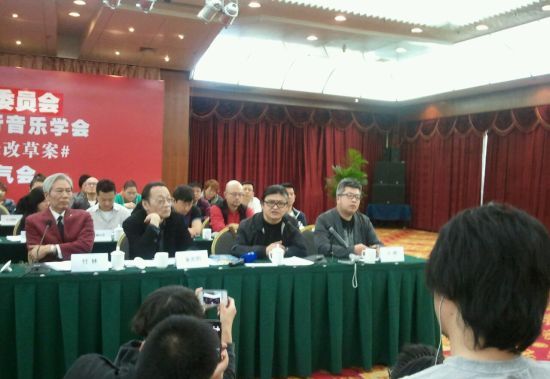Music producers voice fears over amendment
- By Lu Na
 0 Comment(s)
0 Comment(s) Print
Print E-mail China.org.cn, April 13, 2012
E-mail China.org.cn, April 13, 2012
The Record Industry Committee of China Audio and Video Association and the Pop Music Society of Chinese Musicians' Association held a meeting in Beijing on April 11 to discuss current developments in the music industry, as well as Articles 46, 48, 60, 69 and 70 of the draft amendment to the Copyright Law. (See also: New copyright law amendment under fire)
|
|
|
Liu Huan, a famous singer, expresses his opinion at the meeting, Apr. 11. [sina.com.cn] |
Forty-seven representatives of the Record Industry Committee attended the meeting, including famous singers, music producers and record company representatives.
Those attending the meeting expressed their opinions regarding the revision of Articles 46, 48, 56, 59, 69 and 72 and the abolition of Articles 60 and 70.
Attendees concurred that Articles 46 and 48 would likely precipitate the collapse of the music industry, at least in its present form, as it allows any record producer or singer use copyrighted songs without obtaining authorization from the original owner, as long as the content has been in publication for at least three months.
Besides, the draft also strengthens the monopoly position of the copyright collective administration organizations. Some have commented that it does not augur well for the future of the music industry.
"Officials who proposed the draft have ignored the current situation of the music industry,“ renowned music producer Song Ke said, "In addition, they don't know the rules of the music industry or the music market." Song, having also stated that the record industry is dead, is now also running a roast duck restaurant.
According to Song, there are three main problems with the amendment: relevant departments neglect the interests of music producers; the amendment strengthens the monopoly of copyright collective administration organizations (such as the Music Copyright Society of China) and does nothing to address the problem of copyright infringement on the Internet.
Renowned Chinese singer Liu Huan said that the amendment considered all parties' interests except those of music producers. "According to the new amendment, three months after they have been published, our songs can be broadcast anywhere and by anyone, as long as they pay the collective administration organizations," he said. "Shouldn't we music producers also be treated with some dignity? We should be motivated to produce music by financial reward and enjoy space for creativity and should not be deprived of any of these elements."
Liu does not agree with assertions that Articles 46 and 48 encourages the dissemination of works. "Copyright Law is there to protect the rights of authors while dissemination is protected by other laws," he said. "If copyright holders can't be protected, the market will be swamped by substandard music and eventually give way to superior music from Europe, the United States, Japan and South Korea. Our market will merely become their advertising platform, which is the most dangerous thing. This is ultimately self-destructive for us."
According to Article 70, users who have signed a contract with the copyright collective administration organizations are not liable for compensation in the event that obligees lodge a complaint about the same right and the same use of litigation. However, they must stop using the content and pay a user's fee to the copyright collective administration organizations in accordance with the contract or law.
"Article 70 must be deleted. If not, our all members of the Record Industry Committee will leave the Music Copyright Society of China," said Zhou Yaping, CEO of Beijing New Run Entertainment Co., Ltd. Zhou also called for the abolition of Article 60, which allows copyright collective administration organizations to apply to the National Copyright Administration to exercise copyright and related rights on behalf of the interested party.
In addition, he suggested that relevant departments should alter the three months stipulated in Article 46 to three years. He also suggested changing the stipulation "the licensee shall not exercise the same right without the permission of copyright holders" to "the licensee and assignee shall not exercise the same right without the permission of copyright holders."
The Record Industry Committee will submit all comments and opinions to the National Copyright Administration.
The National Copyright Administration published a preliminary amendment draft to revise China's copyright laws on its official website on Mar 31. The website is accepting suggestions and advice regarding the amendment from all sectors until April 30.







Go to Forum >>0 Comment(s)